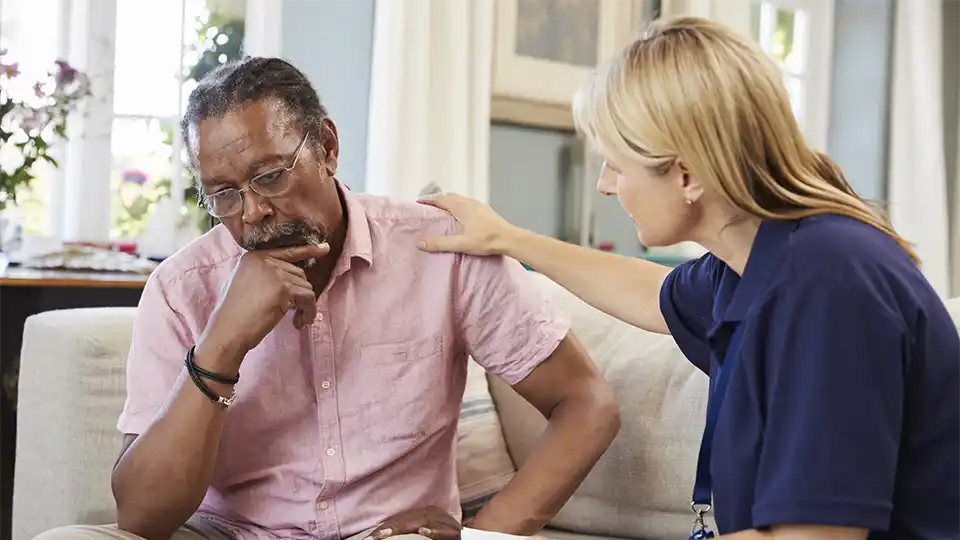
The death of a loved one is always brutal to cope with. Grief and bereavement are often short-term reactions to this type of loss, but they can also have long-lasting effects if not adequately dealt with. This blog post will explore how you might be feeling after losing somebody close to you. Bereavement counselling is available for people dealing with bereavement and grief, and give some tips on how best to deal with your emotions during this period.
Key takeaways
- Bereavement counselling can often help someone’s journey through grief.
- There are different types of grief, and people cope differently.
- There are quality free services for help with grief in the UK.
Table of contents
What is grief?
The first step to understanding grief is knowing what it actually entails. Grief can be defined as the experience of deep sadness, distress and emotional pain caused by the loss of someone or something important in your life. No two people grieve in exactly the same way, but there are common feelings you may have after losing somebody close to you: You might feel numbness or emptiness at first – especially when dealing with a sudden death like an accident.

Grieving for a loved one will take time. Finding ways to cope could help you deal with this difficult period more effectively; however, if your grief becomes severe over time, please seek professional advice from your GP or counsellor. There are many support networks available for people who have lost somebody close to them, but it is essential not to neglect your own needs during this time, or else you risk making things worse in the long run.
It is okay if you don’t feel like doing anything at first; however, try getting out of bed and going outside when possible, as fresh air can improve your mood and make transitioning back into everyday life a little easier.
During difficult moments we often forget about taking care of our own physical health, so remember that having regular exercise is one way of coping with bereavement. Attending group classes whic you find enjoyable, such as Zumba, Yoga or Pilates can help with grief.
How to deal with grief & bereavement
A useful way of coping with grief is writing a letter or an email to the person you have lost, as it can help you come to terms with their death and express your feelings in ways that may be difficult face-to-face. It can also be helpful to do something creative such as painting, drawing or making music which allows us to convey our emotions through art. You might find looking at photographs from happier moments together comforting too.
In addition, many people benefit from attending bereavement counselling sessions after experiencing the loss of somebody close – especially if they are finding it hard going back to work. This will give them time out from ordinary life and allow them space for reflection on what they have without feeling under pressure by family members or friends.
You may not feel like you want to do anything at first, but it is important that you try and eat healthily, sleep well and take care of yourself during this challenging time as your body needs rest in order to recover from the shock.

Going back to work after a bereavement or dealing with everyday life can be extremely hard when all you really want is time off – so don’t worry if this sounds daunting for now. If possible, talk about how you are feeling with somebody close such as a sibling or friend who might be able to give their support over the next few weeks until things have started looking up again.
Of course, you will always miss loved ones after they pass away; however, being proactive by attending counselling sessions or taking part in a hobby can help you come to terms with their death and remember the good times spent together.
In addition, it is important to remember that there will always be things worth celebrating even in the darkest of times. You might not feel like doing anything and that’s okay; however, finding small things to look forward to such as visiting a local park or cinema can help you transition back into everyday life before too long. Although sometimes professional bereavement counselling is needed.
Different kinds of grief and bereavement
There are several different kinds of grief and loss which can affect somebody at any time in their life, including:
- Loss through death – such as when a loved one passes away
- Loss through separation or divorce
- A major change like becoming unemployed or retiring
- Following the end of an important relationship such as marriage or someone close to you (e.g. a friend).
Coping with all these types of losses can be extremely difficult; however, there is no right way to grieve, and everybody’s experience will vary depending on what has happened and who they were before it occurred. It may make coping easier if you try talking about your feelings rather than bottling them up inside because this could lead to depression down the line.

Do i need bereavement counselling needed?
It can be extremely tough for someone to cope with the loss of a loved one as it brings up so many questions and emotions. In order to offer bereavement support to somebody who is going through this, you could:
- Allow them time alone if they need it.
- Talk about your memories together
- Don’t force them into talking about their feelings
- Encourage them to do something creative which allows them to convey their emotions through art.
- Keep in touch by sending regular messages – even if it’s just checking that they’re okay.
- Tell your friend (or family member) that you are there for them whenever they feel like talking.
- Letting people know that you care during these difficult times will make all of the difference. In addition, it may help to attend bereavement counselling sessions as this will allow them time away from normal life. This can then give them a chance to reflect on what happened without feeling under pressure by family members or friends.
People deal with grief in different ways, so everybody’s experience of bereavement will vary depending on what has happened. It can be helpful for somebody who is grieving if their loved ones are open about how they feel too because it might make them realise that other people also struggle when somebody dies.
How to help children who need bereavement counselling

If a child is experiencing bereavement (e.g. the loss of a pet) or going through grief (e.g. parents’ divorce), you could:
- Be honest and open about what happened, but don’t over elaborate
- Let them know that it’s okay if they cry
- Play games with them to help them feel more comfortable
- Help them to write down their fond memories
- Encourage creativity by allowing them to draw pictures
- Ask questions such as ‘What do you think X would say now?’ because this can help children process their thoughts. In addition, encouraging your friend (or family member)’s kids to be creative will give them an outlet for their emotions. Allowing people space during these difficult times often helps; however, don’t forget that you are there for your loved one if they ever need somebody to talk to.
What does the grieving process look like?
The grieving process usually takes place in stages:
- Denial: “This isn’t happening”
- Anger: “Why is this happening?”
- Bargaining: “I’ll do anything if you come back”
- Depression: Feelings of sadness and emptiness
- Acceptance: Beginning to accept what happened; moving forward
Although the above stages may not apply to everyone or every situation, they are recognised by psychologists as common reactions when dealing with bereavement and grief. It’s okay for people who have these difficult times simply to take things one day at a time. However bereavement counselling should be sought if the extreme feelings of despair and sadness do not go away.
If somebody needs bereavement support, it can be extremely difficult for them to come out of their shell and accept what happened. However, talking about your memories together may help you both feel better. Give yourself plenty of time before trying to move on because the grieving process takes place over an extended period – even years! It’s okay if people want space during this difficult period; however, don’t forget that they are there for you whenever they’re ready.

In conclusion, grief can be a very difficult time for everybody involved. However, it’s important to remember that everyone is different, and they will deal with their grief in a unique way. Try not to be too hard on yourself if you’re having trouble coping – instead, talk to somebody about how you feel!
How to deal with a terminal illness
It’s normal to feel all sorts of different emotions when dealing with a terminal illness. It can be both distressing and frustrating. People can respond differently to this type of loss, so everybody is going to deal with their grief in slightly different ways. If somebody you know is diagnosed with a serious condition, make sure that they are aware that you’re there for them if they ever need somebody to talk to.
If your loved one becomes frustrated by the situation at hand, try not to get angry because this won’t help anybody involved and will just cause more tension between each other. It may also be beneficial for people who are dying (or have someone close to them) if family members don’t always share their thoughts and feelings because this can help them cope better.
Conclusion
People with long term coping problems who need professional help such as depression, bereavement, and terminal illness should seek professional advice from qualified bereavement consellors if the links above from the recognised, reputable organisations are not able to help.
Bereavement and loss counselling is an important step for many. You can find additional bereavement counselling help at :

One thing which can help bereaved relatives who are struggling emotionally after somebody’s death is knowing what kind of funeral or memorial service the person wanted – whether light-hearted or not.
Asking people close to them for anecdotes or memories could give an idea as well, particularly those which sum up their personality perfectly like “He always liked things done his way”. If these requests aren’t honoured, then feelings of anger, and sadness may arise.
Further information and help can be found at Support with Bereavement.



